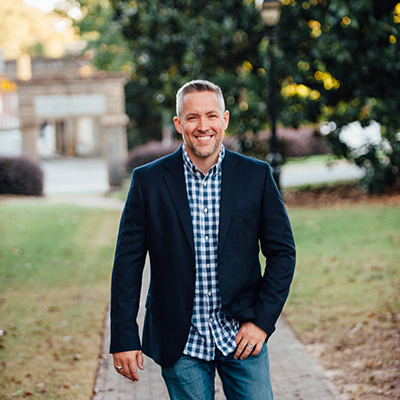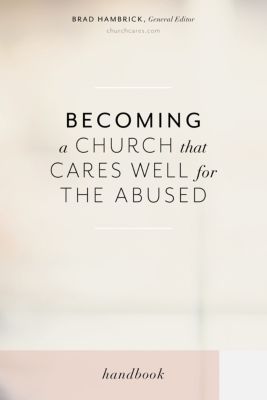
Seeking to pay careful attention to the sexual abuse issue is not a distraction from the gospel mission of the church.
By J.D. Greear
Editor’s note: Sunday, September 24, 2023, is Caring Well Sunday.
When it comes to sexual abuse, you’ve probably read a lot of statistics. For instance, you may already be aware that about 1 in 6 American women has been the victim of sexual assault or that only 25 out of every 1,000 abusers will end up in prison. For most of us, those statistics can feel overwhelming. And for many of us, those statistics feel intensely personal and horrific—after all, these aren’t merely numbers but real human lives. We don’t think of numbers but names.
One statistic, though, has been on my mind a lot recently. It’s not about the abuse survivor or the abuser. It’s about the church’s role in all of this. According to a 2019 Lifeway Research study, about 1 in 10 churchgoers under 35 have left a church over its failure to take sexual misconduct seriously. And who could blame them?
There was a time, not too long ago when certain people in ministry could comfort themselves with the thought that this was someone else’s problem. That denomination. Or those leaders. But it could never happen in my church, in my denomination, with my pastor at the helm. The brutal series of new revelations from the past few years should disabuse all of us of such wishful thinking. Abuse is a tragically relevant issue for every church in America. How we respond matters.
“Abuse is a tragically relevant issue for every church in America. How we respond matters.” — @JDGreear Click To TweetAddressing abuse is a gospel issue
One of our values at The Summit Church, where I serve, is this: “We prioritize the gospel above all.” In everything we do, the gospel provides the framework for our mission. The gospel provides the fuel for our actions. The gospel provides the content of our message. If the gospel isn’t involved—it doesn’t matter how important the task is or how exciting the opportunity is—it’s simply not in our scope as a church.
Some have taken this idea and carried it to an unhelpful and unnecessary conclusion—that since the gospel frames our mission, addressing sexual abuse in the church is a distraction from “the main thing.” To which I say: absolutely not.
Seeking to pay careful attention to the sexual abuse issue is not a distraction from the gospel. It is part and parcel of what we mean when we say, “We prioritize the gospel above all.” As many of my fellow pastors have said, this is a gospel issue.
Telling the truth about the gospel
At its core, the gospel we preach is about God’s covenant to heal and make whole. How can we preach a message of healing and wholeness if we refuse to make our churches safe places for the vulnerable? Why would survivors trust us to care for their souls if they’re not sure if they can trust us to care for their wounds? Why would the lost trust us with the message of salvation if they’re not sure they can trust us with the safety of the defenseless?
The cross of Jesus Christ shows us He is a safe refuge for all who run to Him. If we’re not doing whatever it takes to make our churches safe places for the vulnerable, we are telling a lie about Jesus. We are betraying the gospel. And a betrayal of the gospel can never serve the interests of the gospel.
“The cross of Jesus Christ shows us He is a safe refuge for all who run to Him. If we're not doing whatever it takes to make our churches safe places for the vulnerable, we are telling a lie about Jesus.” — @JDGreear Click To TweetJesus said that for whoever causes a little one to stumble, it would be better for a millstone to be hung around his neck and cast into the sea (Matthew 18:6). What could cause a little one to stumble more than having those who represent God abuse them? What could betray trust more than God’s appointed leaders protecting those who abuse the defenseless?
So addressing abuse is not a distraction from the work of the gospel. It’s not an interruption from our mission. It’s absolutely central.
Safe for Survivors, Safe from Abuse
Every last church should be safe for survivors and safe from abuse.
Nearly everyone in ministry would agree with that statement. But many of us need to admit we haven’t really been trained in the processes to get us there. In the many meetings I’ve had with survivors, it’s been clear they don’t need more words, statements, or resolutions. The problem of sex abuse didn’t occur because our words weren’t right but because many churches fostered a culture that made abuse possible.
What is needed in our churches is a culture shift, which for many will entail new policies, new partnerships, and new education. I, for one, didn’t take any courses about sexual abuse during my seminary years. Few pastors have. Nor would I have been able to say when (or how) to involve external authorities—like the police or Child Protection Services. Rather than resigning ourselves to that lack of knowledge—and passing it on to our congregations—we can chart a new direction. Our future doesn’t have to be an echo of the past.
“The problem of sex abuse didn’t occur because our words weren’t right but because many churches fostered a culture that made abuse possible.” — @JDGreear Click To TweetCaring well
One of the simplest steps churches can take is joining in the Caring Well challenge, which is specifically designed to help churches become places that are safe for survivors and safe from abuse.
But this isn’t just something for church leaders. Every person in the church should realize they are an active participant in helping to care for the abused. As survivor and advocate Susan Codoni has said, it’s going to take the entire church to deal with this problem.
Is it difficult to talk about abuse? Absolutely. We worry we’ll say the wrong thing or bring up some painful memory. But because our God is a God of justice, because He is a defender of the weak, because He is a refuge for the vulnerable, the church must speak and we must act on this important issue.
Our God is a God who hears the cries of His people. And we who bear His name are called, therefore, to be His hands, feet, ears, and mouth—which means we must listen, speak, and act.
My prayer is that we would reflect more and more the God of justice whom we serve, who, as the psalmist says, is “our refuge and our strength, a helper who is always found in times of trouble” (Psalm 46:1, CSB). May we look to Him in our tireless efforts to make the church safe for survivors and safe from abuse.
For permission to republish this article, contact Marissa Postell Sullivan.

J.D. Greear
J.D. is the pastor of The Summit Church, in the Raleigh-Durham area of North Carolina. He’s the author of several books, including What Are You Going to Do with Your Life?












